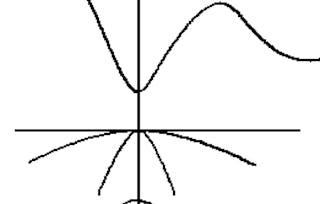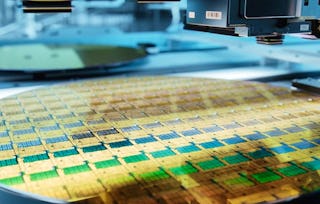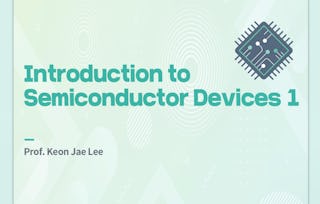This course can also be taken for academic credit as ECEA 5630, part of CU Boulder’s Master of Science in Electrical Engineering degree.

Semiconductor Physics

Semiconductor Physics
This course is part of Semiconductor Devices Specialization

Instructor: Wounjhang Park
36,308 already enrolled
Included with
299 reviews
What you'll learn
Understand the energy band structures and their significance in electric properties of solids
Analyze the carrier statistics in semiconductors
Analyze the carrier dynamics and the resulting conduction properties of semiconductors
Skills you'll gain
Details to know

Add to your LinkedIn profile
4 assignments
See how employees at top companies are mastering in-demand skills

Build your subject-matter expertise
- Learn new concepts from industry experts
- Gain a foundational understanding of a subject or tool
- Develop job-relevant skills with hands-on projects
- Earn a shareable career certificate

There are 4 modules in this course
In this module we will introduce the course and the Semiconductor Devices specialization. In addition, we will review the following topics: Type of solids, Bravais lattices, Lattice with basis, Point defects, Dislocation, Bulk crystal growth, Epitaxy, Energy levels of atoms and molecules, Energy bands of solids, Energy bands in real space, Energy bands in reciprocal lattice, Energy band structures of metal and insulator, Definition of semiconductor, Electrons and holes, and Effective mass.
What's included
9 videos5 readings1 assignment1 peer review2 discussion prompts
In this module, we will cover carrier statistics. Topics include: Currents in semiconductors, Density of states, Fermi-Dirac probability function, Equilibrium carrier concentrations, Non-degenerate semiconductors, Intrinsic carrier concentration, Intrinsic Fermi level, Donor and acceptor impurities, Impurity energy levels, Carrier concentration in extrinsic semiconductor, and Fermi level of extrinsic semiconductors.
What's included
5 videos2 readings1 assignment1 peer review1 discussion prompt
This module introduces you to currents in semiconductors. Topics we will cover include: Thermal motion of carriers, Carrier motion under electric field, Drift current, Mobility and conductivity, Velocity saturation, Diffusion of carriers, General expression for currents in semiconductor, Carrier concentration and mobility, and the Van der Pauw technique.
What's included
4 videos2 readings1 assignment1 discussion prompt
In this module we explore carrier dynamics. Topics include: Electronic transitions in semiconductor, Radiative transition, Direct and indirect bandgap semiconductors, Roosbroeck-Shockley relationship, Radiative transition rate at non-equilibrium, Minority carrier lifetime, Localized states, Recombination center and trap, Shockley-Hall-Reed recombination, Surface recombination, Auger recombination, Derivation of continuity equation, Non-equilibrium carrier concentration, Quasi-Fermi level, Current and quasi-Fermi level, Non-uniform doping, and Non-uniform bandgap.
What's included
8 videos2 readings1 assignment1 peer review
Earn a career certificate
Add this credential to your LinkedIn profile, resume, or CV. Share it on social media and in your performance review.
Build toward a degree
This course is part of the following degree program(s) offered by University of Colorado Boulder. If you are admitted and enroll, your completed coursework may count toward your degree learning and your progress can transfer with you.¹
Instructor

Offered by
Explore more from Electrical Engineering
 Status: Free Trial
Status: Free TrialUniversity of Colorado Boulder
 Status: Free Trial
Status: Free TrialArizona State University
 Status: Preview
Status: PreviewKorea Advanced Institute of Science and Technology(KAIST)
 Status: Free Trial
Status: Free TrialArizona State University
Why people choose Coursera for their career

Felipe M.

Jennifer J.

Larry W.

Chaitanya A.
Learner reviews
- 5 stars
64.88%
- 4 stars
21.73%
- 3 stars
6.35%
- 2 stars
1.67%
- 1 star
5.35%
Showing 3 of 299
Reviewed on Jul 24, 2020
The course structure is good. But the exercises are quite hard and no lectures are based on solving such problems.
Reviewed on Jun 4, 2020
A very useful course for me to understand semiconductor physics. And systematically operated course.
Reviewed on Aug 6, 2020
Concepts are logically placed,with clear explanation

Open new doors with Coursera Plus
Unlimited access to 10,000+ world-class courses, hands-on projects, and job-ready certificate programs - all included in your subscription
Advance your career with an online degree
Earn a degree from world-class universities - 100% online
Join over 3,400 global companies that choose Coursera for Business
Upskill your employees to excel in the digital economy
Frequently asked questions
To access the course materials, assignments and to earn a Certificate, you will need to purchase the Certificate experience when you enroll in a course. You can try a Free Trial instead, or apply for Financial Aid. The course may offer 'Full Course, No Certificate' instead. This option lets you see all course materials, submit required assessments, and get a final grade. This also means that you will not be able to purchase a Certificate experience.
When you enroll in the course, you get access to all of the courses in the Specialization, and you earn a certificate when you complete the work. Your electronic Certificate will be added to your Accomplishments page - from there, you can print your Certificate or add it to your LinkedIn profile.
Yes. In select learning programs, you can apply for financial aid or a scholarship if you can’t afford the enrollment fee. If fin aid or scholarship is available for your learning program selection, you’ll find a link to apply on the description page.
More questions
Financial aid available,

